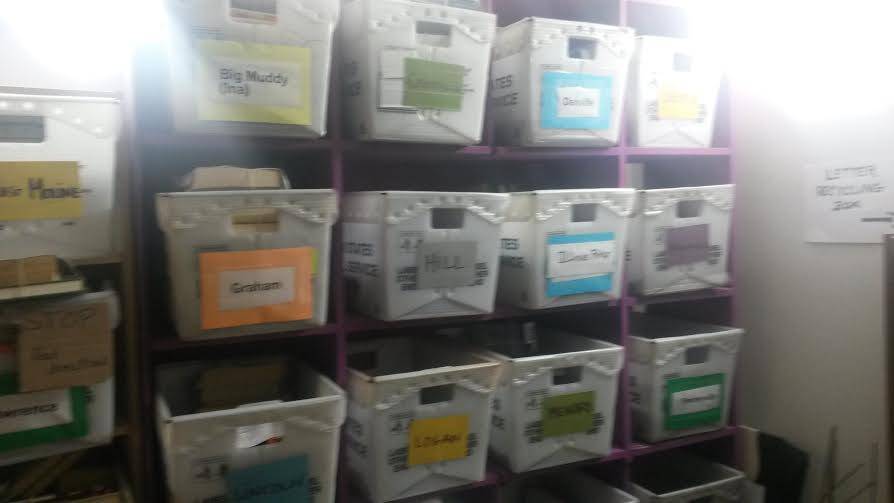 Alright, so by now you all probably know that I am a sucker for books. I’m that person in my dorm who has actually used the bookcase for its intended purpose-holding books, lots and lots of books. So I suppose it’s really no surprise that I had the wonderful opportunity to interview Lolita Dumas, the volunteer supervisor for Books to Prisoners about their upcoming book sale, Pages for Pennies, on April 11th, 2015. Before I delve into the interview, I first want to urge you to truly read the entire interview, not just skim it and move on because what this not-for-profit, completely volunteer group does is an example of what volunteering is about. They help the people we all try and forget about, prisoners, when those are the people who really need the most help. So thank you for taking the time to read the interview and I hope it inspires you enough to go support Books to Prisoners by doing the simplest thing in the world, buying a book.
Alright, so by now you all probably know that I am a sucker for books. I’m that person in my dorm who has actually used the bookcase for its intended purpose-holding books, lots and lots of books. So I suppose it’s really no surprise that I had the wonderful opportunity to interview Lolita Dumas, the volunteer supervisor for Books to Prisoners about their upcoming book sale, Pages for Pennies, on April 11th, 2015. Before I delve into the interview, I first want to urge you to truly read the entire interview, not just skim it and move on because what this not-for-profit, completely volunteer group does is an example of what volunteering is about. They help the people we all try and forget about, prisoners, when those are the people who really need the most help. So thank you for taking the time to read the interview and I hope it inspires you enough to go support Books to Prisoners by doing the simplest thing in the world, buying a book.
Smile Politely: So what is the book sale for?
Lolita Dumas: The book sale is our main fundraiser to help us with shipping postage. Since we are a not-for-profit organization it means anything we receive is based on donations, so our book sale is one of our most important fundraisers to help us with our shipping and packaging costs.
SP: What can people donate to the book sale and Books to Prisoners in general?
Dumas: They can donate money, books, computers, anything they want because all of our operating expenses are based off of donations we receive.
SP: So when did Books to Prisoners get started?
Dumas: It started in 2004 so we actually celebrated our 10th anniversary last year. It began with a U of I student who was given a handful of letters and was told hey, do something with this and they did. Books to Prisoners actually moved 10 years ago to IMC, so this is where it became a bit bigger in terms of its operation but I like to think that it all started with a handful of letters.
 SP: Are volunteers anybody from the community who’s interested in helping out?
SP: Are volunteers anybody from the community who’s interested in helping out?
Dumas: Anybody can come there’s not an age limit or anything. The youngest volunteer we had was a sixth grader and he actually did really well, though I think now with most schools no longer teaching cursive that was a little challenging for him. And it’s not that you have to be an avid reader or anything like that, you just have to have the willingness to look for some books and put an order together. And the thing with volunteering is we have people who help us out behind the scenes, so from their home or any other place. For example for our publicity committee we have one woman who volunteers at the jail library and she also helps out in the work room, but a lot of the work she does for the book sale is not even in the work room so it’s very flexible.
SP: That sounds great, is it easy to keep people then?
Dumas: Well it’s an even flow, in the sense that it’s easy to keep people because they’ll drop by when they have time in their schedule, but it’s not consistent every week because it’s not a requirement. But we do have people who often come back once they’re schedule becomes a little less busy so we do enjoy returns. It’s maybe not as consistent but that’s the beauty of the program you can volunteer when you have time, and also with the Jail Library people may volunteer for that because it works a little better with their schedule but then they’ll also volunteer back in the workroom.
SP: What does an average volunteer session look like?
Dumas: Well if you’re a first time volunteer we ask you to come at the beginning of the session for orientation and then you can stay for the rest of the session. Once you have orientation you can come back as many times as you like. You’ll first start by getting a letter from an inmate and you’ll see what the inmate is requesting, and whatever the inmate requests you’ll try and find in our library. Sessions last two hours but the beauty of the volunteer program is you don’t have to stay the full two hours you can go whenever you need, and it’s just whatever amount of time you can give.
SP: How often do you get a shipment of letters?
Dumas: Our shifts are every Tuesday, Thursday, and Saturday so that’s generally when we pick up the letters, and we probably have about 30-40 letters a session.
SP: How often are you able to ship out books to inmates?
Dumas: Well it depends on volunteers, which why it’s really good to have a thriving community. I’ve been here since 2011 and for the last two years we’ve been able to keep up really close to the dates of the letters and how close we ship the books out. We have about a week gap at the moment, which is great because for the last two years we have had a really steady flow of volunteers where we stay relatively within two weeks of the letter. Shipping on the other hand is a little different because I’m the only actual employee, I work about 12-15 hours a week and everyone else is a volunteer. In the scheme of things though that’s not a whole lot to keep everything fully functioning and there’s only about 3-4 volunteers who do packing so our packing has been backed up at times. So while we’re filling letters there might be letters in the bin that haven’t been shipped out yet. We’re actually in the middle of a shipping pilot since we’re a not for profit we’re always trying to control our shipping costs, so we did a pilot with FedEx and now we’re doing one with UPS. And so in the midst of not having a lot of volunteers who do packing and our shipping pilots it varies in terms of how quickly we can get the books out.
 SP: What’s the most popular book requested?
SP: What’s the most popular book requested?
Dumas: Our dictionaries are our most requested book and it’s the only book, in addition to a Thesaurus, that we actually purchase. However since those are the only two books that we buy we limit it to one dictionary per life of the program, and that’s to control costs. They’re the most requested books because inmates will be trying to improve themselves or learn another language. There are times though if, say an inmate is now in college English or something similar, and we gave them a dictionary in 2004 that they’ll write asking for an updated dictionary, and if it’s a good reason like that we’ll usually ship them out an updated dictionary.
SP: So if someone asks for a specific book and you don’t have it, what do you do then?
Dumas: Well when we’re filling the order I always tell volunteers to try and give them what they want or as close to it as possible. We had one situation with one gentlemen where he wanted something very specific and I was trying to decide whether or not we should substitute it, and then a gentlemen pointed out that that inmate had been there since the 70’s so I was like, oh wow we should really try and get him what he wants. In general though it depends on the genre and how specific they are. If there’s a specific book they want and nothing else we have a “Problem Box Bin” where a volunteer will reach out to people to see if they can find that specific title. In addition we have this binder called a “Read Alike binder” where we’ve grouped together similar authors, so if an inmate asks for a book and we don’t have it we can go in this binder and find something similar. But there are times where the inmate will say I want this book, but if you don’t have it substitutes are also ok, so it depends on the situation. But we really do try and get them what they want because with our weight restriction of three pounds we only send out books every three to four months, so we want them to be happy with what they’re going to have for that amount of time.
SP: What makes Books to Prisoners important to you or what do you think is most helpful about the program?
Dumas: This is an important program because it tells prisoners that they’re not forgotten and that there is a service that’s free out there to help them. Also when we send books it becomes their private property. Some choose to donate to the library but for many of them, because they’re not able to really keep that much, this becomes something that can be theirs, or they can share with someone else who may not have the same resources to ask for a book. Sometimes we’ll receive letters that’ll have two or three letters in one envelope because someone couldn’t afford an envelope, so we’ll just take that letter and put it in our system and serve them as well. We serve the prisoners all over the state and also the county jail and there’s typically inmates who are awaiting their case or waiting their sentence. So we have a library there where we have carts of books and they’ll go check books in and out and that’s a good way for them to pass their time with some literature and reading.
SP: Have you ever heard of any follow-up stories with inmates who tried to get in contact with BP once they were released?
Dumas: Interestingly enough we have a program in Rantoul called Jesus is the Way Ministry for men who are trying to re-enter into society, and many of them have actually received books from us so they volunteer with us once a month. They also volunteer with us during the book sale so for us that’s a direct connection with benefiting from the program and then giving back.
The Books to Prisoners book sale, Pages for Pennies, will be held on April 11th from 12pm to 5pm at the IMC building, located at 202 South Broadway in Urbana. Children’s books are $0.25, soft cover are $0.50 and hard cover are $1. More information can be found at www.BookstoPrisoners.org.
Photos taken by Meghan McCoy.








